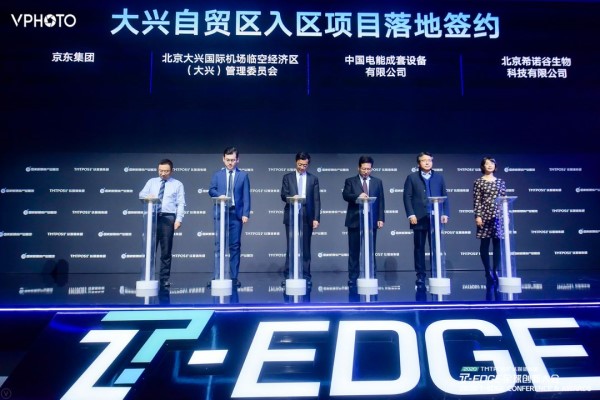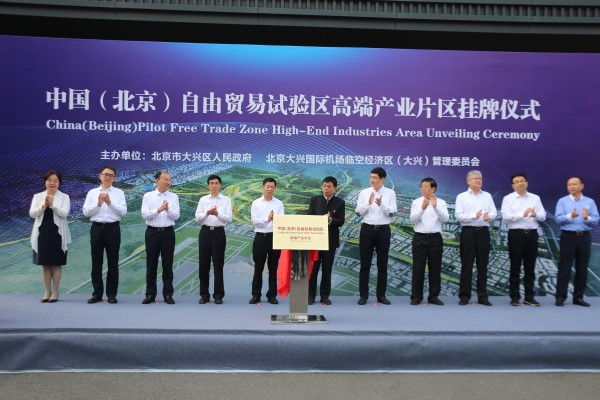Innovative measures released to attract businesses
Daxing economic area aims to become international hub
The Beijing Daxing International Airport Economic Zone is welcoming an increasing number of domestic and international companies as a result of a raft of incentive policies released, according to local officials.
The zone's management committee released its second list of institutional innovations at a news conference during this year's T-EDGE Conference and Awards held from Dec 18-20 in Daxing district, Beijing.
The T-EDGE conference is one of China's most influential events in terms of scientific and technological innovation, acting as a barometer of innovation in the country. Since first being held in 2018, the event has attracted participation from more than 600 leading innovators from over 40 countries and regions.
It has also helped about 300 innovative companies worldwide find investment and business opportunities, and introduced 30-plus projects of different types.

The Beijing airport area signs cooperation agreements with China's renowned companies at the T-EDGE conference in Beijing's Daxing district on Dec 18. [Photo provided by Daxing district]
This year's T-EDGE conference invited a group of top Chinese and foreign scientists, entrepreneurs and innovation leaders to conduct in-depth discussions and exchanges on a series of topics such as digital economy, new infrastructure, digital finance and biomedicine. The second list of institutional innovations comprises 39 measures involving the sectors of airport development, biomedicine, overseas business, digital economy, finance and regional collaboration.
They have been made to foster a world-class business environment at the zone, which strives to become a national integrated demonstration zone for greater openness in the service sector.
The zone will also benefit from the free trade zones in Beijing and Hebei, and help to promote the FTZs in return, according to local officials.
Eight of the 39 measures pertain to airport development, aiming to lead to breakthroughs in aviation maintenance and logistics, and to push forward the turning of the airport into an international aviation hub. Six measures are aimed at biomedicine, one of the zone's key industries.
They include supporting the construction of research-oriented hospitals and to optimizing the management of small-dose special chemicals used for pharmaceutical research and development.
Thirteen new measures are related to overseas businesses, comprising the support of cross-border e-commerce to expand sales channels, to provide high-end overseas talents with preferential personal income tax policies and to promote the building of apartments, hospitals and schools.
They are expected to improve the zone's commercial service and influence, and to ramp up its appeal to enterprises and high-end talents. Since the zone is one of demonstration areas of digital trade in Beijing, five related released measures were released to initiate a pilot program of cross-border data flow. They include building a data exchange center and to developing comprehensive international communication facilities.
In the financial sector, five measures will help local companies with overseas businesses better handle cross-border financial operations and enhance the zone's attractiveness to financial institutions.
Two regional collaboration measures will promote the coordinated development of the Beijing-Tianjin-Hebei region.
A spokesperson of the zone said that more institutional innovative measures will be rolled out in the future, to build the zone into a leading technological innovation area of national aviation, and a demonstration area of Beijing-Tianjin-Hebei coordinated development.
The first batch of institutional innovations launched in January consisting of 81 measures, and half of them have been put into practice so far. As a result, the zone to date has added 306 market players.
The zone as part of the Beijing FTZ is speeding up the formulation of development plans for its high-end industries, which will be issued by the end of this year.

Representatives attend the unveiling ceremony of the China (Beijing) Pilot Free Trade Zone High-End Industries Area in Daxing. [Photo provided by Daxing district]
According to the plans, it will take the lead in the reform of land use and focuses on the improvement of government services and management, investment reform and trade facilitation.
The spokesperson said investment attraction and project implementation will become the cornerstone of these innovative measures, and the zone will actively attract projects from global airlines, service providers, regional headquarters of foreign-funded multinational corporations, research centers and financing and investment institutes.
haonan@chinadaily.com.cn

